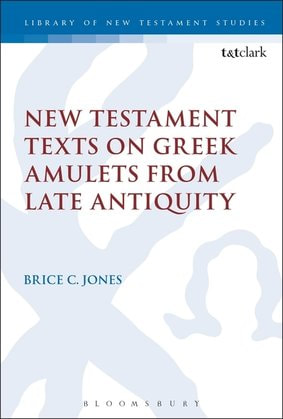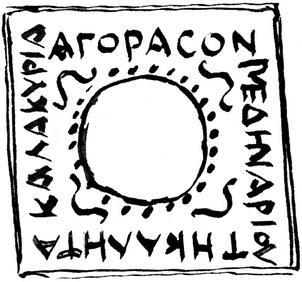τῇ καλῇ τὰ καλὰ κυρίᾳ ἀγορᾶς ὅν με δηναρίου “To the beautiful lady of the market the beautiful things, (a gift offered) with a denarius.” Baratta understands this mirror as a votive offering to the “lady of the market,” which she assumes to be the goddess Artemis or Aphrodite. She takes ὅν as an accusative pronoun that refers back to an omitted noun, such as “gift.” Baratta understands the last line to mean “with a denarius,” that is, a coin offered to the goddess. She takes με as a contraction for μετά. In the latest issue of Zeitschrift für Papyrologie und Epigraphik, Nikos Litinas offers a new transcription and interpretation of this inscription. Litinas reads the inscription as follows: τῇ καλῇ τὰ καλὰ. κυρία, ἀγόρασόν με δηναρίου “To the beautiful lady the beautiful things. Lady, buy me with a denarius.” By taking αγοραc with ον to form the imperative ἀγόρασόν, Litinas solves all the difficulties. Now, the inscription can be understood in a whole new way: it is an inscription to the potential buyer urging her to buy the mirror for the price of one denarius. Litinas points to other similar inscriptions, most importantly another mirror from Moesia Inferior that reads Κύρα, ἀγόρασόν με ("Lady, buy me."). Who knew mirrors could talk! I wonder: did this business tactic work in the ancient world? In today's market, such a slogan might not go over so well. I found this product online, which is actually a bit more pushy ("buy me now!"). Baratta, Giulia. "Gli specchietti votivi in piombo dedicati alla κυρίᾳ ἀγορᾶς." In Àgalma. Ofrenda desde la Filología Clásica a Manuel García Teijeiro. Eds. A. Martínez Fernández, B. Ortega Villaro, H. Velazco López et al. Valladolid, 2014, 709–713.
0 Comments
Your comment will be posted after it is approved.
Leave a Reply. |

Available at Amazon!
Archives
June 2020
Categories
All
|
